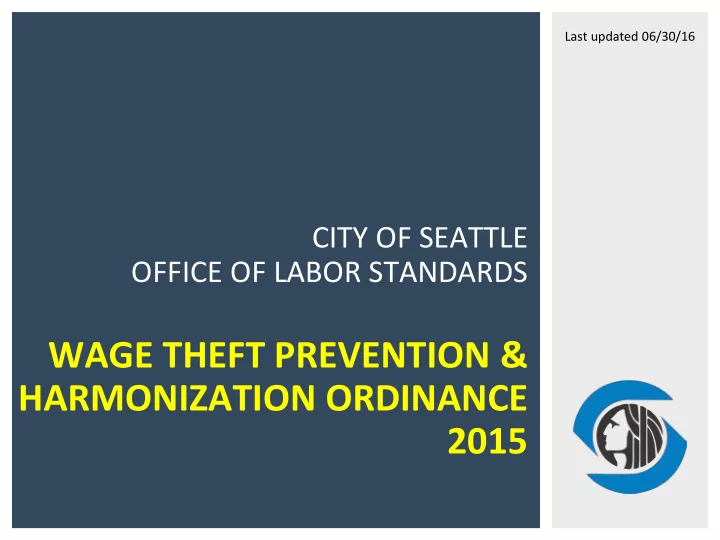

Last updated 06/ 30 /16 CITY OF SEATTLE OFFICE OF LABOR STANDARDS WAGE THEFT PREVENTION & HARMONIZATION ORDINANCE 2015
GOALS LS Develop an enforcement process that ensures workers receive owed compensation as quickly as administratively possible. Deter violations of labor standards using increased penalties and other remedies. Provide flexibility in enforcement so as to not unduly penalize genuine mistakes.
PRIVATE RIGHT OF ACTION PSST, MWO, WT (not FCE) Effective date dependent on size of business: ▪ April 1, 2016 for businesses with 50 or more employees, and ▪ April 1, 2017 for businesses with fewer than 50 employees
INCREASED R REMEDIE IES F FOR W WORKERS PSST, MWO, WT - Wages or compensation ▪ Treble Damages (3x the amount owed) Fair Chance Employment Ordinance - Use of Conviction/Arrest Records ▪ 1 st violation – up to $500 to aggrieved party ▪ 2 nd violation – up to $1000 to aggrieved party ▪ 3 rd violation – up to $5000 to aggrieved party All ordinances - Retaliation ▪ Up to $5000 to aggrieved party + reinstatement or up to 3x front pay in lieu of reinstatement
STRENGTHENED P PENALT LTIES PSST, MWO, WT - Tiered civil penalties ▪ 1 st violation – (discretionary) up to $500 per aggrieved party ▪ 2 nd violation – up to $1000 per aggrieved party ▪ 3 rd violation – up to $5000 per aggrieved party All ordinances - Chart of fines for each ordinance
ENCOURAGING WORKER REPORTS Increased protections against retaliation ▪ Rebuttable presumption of unlawful retaliation for adverse actions within 90 days of protected activity ▪ Unlawful retaliation = protected activity is a “Motivating factor” in any adverse action ▪ Remedies = reinstatement or up to 3x front pay; penalty to aggrieved party up to $5,000; and fine to agency of $1000 per aggrieved party Confidentiality requirements in all ordinances U Visa certification ▪ Employees who report certain wage theft violations to can apply for a nonimmigrant status visa for themselves and family members
GETTING MONEY TO WORKERS Mitigation of penalties if workers are quickly paid ▪ Within 10 days – penalties waived ▪ Within 15 days – penalties halved ▪ After 20 days – penalties remain Collections agency Liens and garnishing wages Deposit of funds or bond as interim relief Business license revocation for unpaid final orders City Contract debarment ▪ No bidding until the amount in the final order is paid in full ▪ No bidding for two years for two or more final orders within five years ▪ Debarment provisions in the labor standards ordinances are in addition and separate from debarment provisions in Chapter 20.70 for prevailing wage
ENFORCEMENT PROCEDURES Same enforcement procedure for all ordinances Investigations start with or without complaints Statute of limitations is 3 years for all ordinances Same definition of “employee” and “employer” to support joint employer liability Director has discretion for settlements, treble damages in first violation and penalties
MINIMUM WAGE Employer Schedule Size Count employees worldwide to determine employer schedule size Work Study Students Covered by the ordinance (removed exemption)
WAGE THEFT Written “notice of employment information” Required for all employees (hourly and overtime exempt) 1. Employer name 2. Employer address 3. Employer Telephone number 4. Employee's rate or rates of pay 5. Tip policy 6. Pay basis = Hour, shift, day, week, commission 7. Established pay day Definition of “Compensation” Expanded to include reimbursement for employer expenses, bonuses, etc.
PAID SICK & SAFE TIME Benefit Year Employers must use a consistent 12 month consecutive period (e.g. calendar year, fiscal year, anniversary date, but not rolling year) for accrual, use and carry over . Written PSST Policy Employers must provide employees with written PSST policy starting April 1, 2016 . Use in 15 minute Increments For hourly, non-exempt employees, employers must permit use of PSST in the smaller of hourly increments or, if feasible by the employer's payroll system, increments that round to the nearest quarter of an hour (i.e. 15 minutes). For overtime exempt employees, employers may permit use of PSST in accordance with state and federal wage and hour laws.
PAID SICK & SAFE TIME Occasional Basis Employees Employees who are typically based outside of Seattle and work in Seattle on an irregular basis, must work 240 hours in a calendar year to qualify for PSST After meeting this threshold requirement, employee is covered by ordinance for duration of employment for employer and all previous hours worked in Seattle accrue PSST Successor Employers When an existing business is purchased, the successor employer must retain the employees’ previously accrued PSST hours
IMPORTANT DATES January 16, 2016 Most ordinance provisions go into effect; some are delayed April 1, 2016 Private right of action for claims against businesses with 50 or more employees Workplace poster enforcement for all ordinances Written PSST policy Written “notice of employment information” for all existing and future employees (exempt and non-exempt) April 1, 2017 Private right of action for claims against businesses with fewer than 50 employees
seattle.gov/laborstandards laborstandards@seattle.gov 206-684-4500
Recommend
More recommend